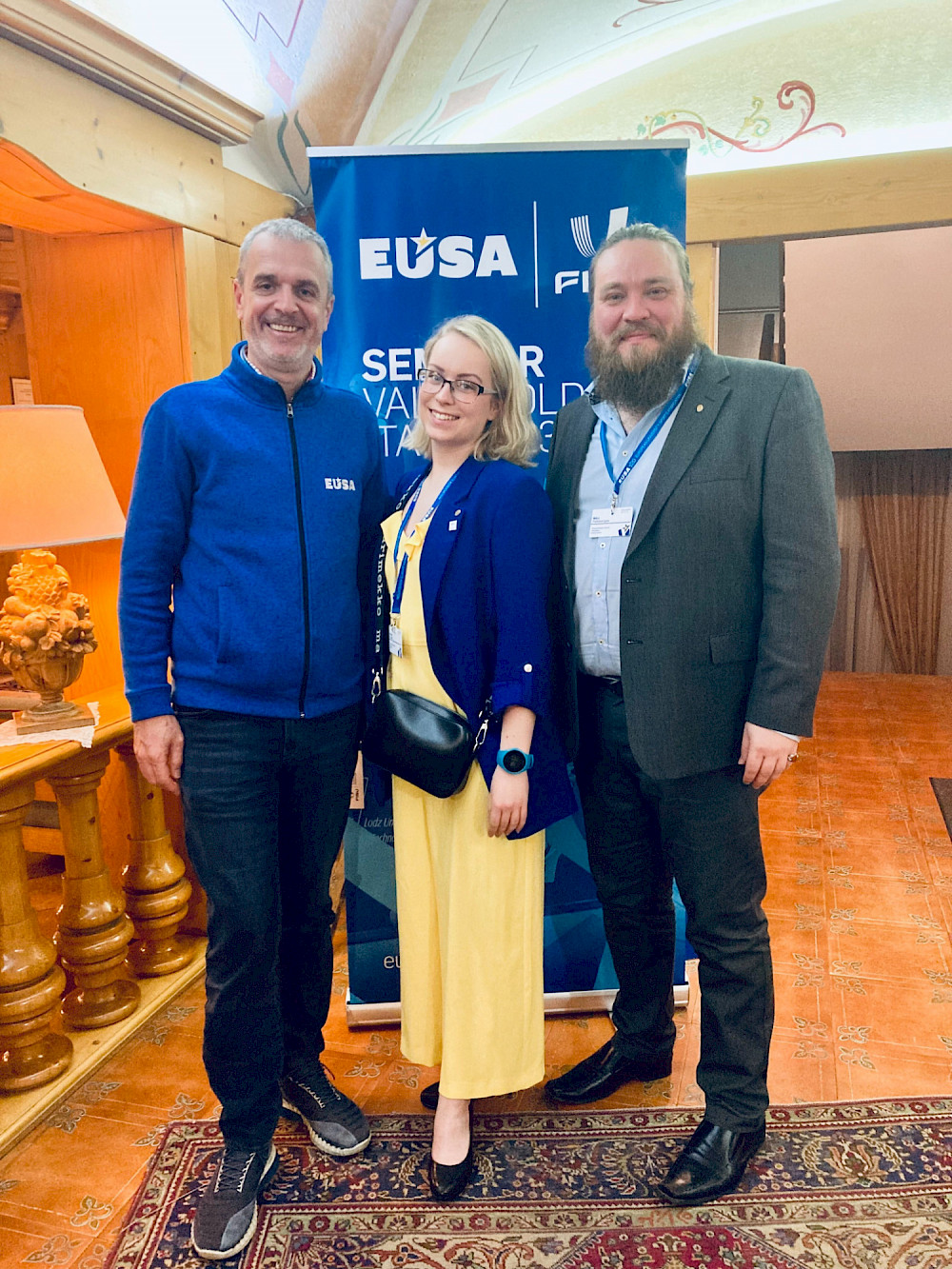International sports advocacy in the shadow of war
Universiades, Russian ministers and university sports services – there is a lot going on in international student sports, both on playing fields and in meeting rooms. OLL’s Secretary General Niko Peltokangas writes about how the Federation is exerting influence in international umbrella organisations.

OLL’s international activities seem to have kicked off with a bang at the start of this year. But then again, the duo in charge of international affairs – President Emilia Junnila and I – are fairly new at this job, so even normal things can easily seem new and full on. Luckily, we have experienced experts in charge of the Federation’s international sports competitions, and they also support our lobbying work in the umbrella organisations.
My most memorable experience so far was the trip Emilia and I took at the end or March to the EUSA–FISU seminar in Val Di Zoldo, Italy. EUSA is the European umbrella organisation for university sports, while FISU is the international federation. OLL is a member of both these organisations.
The most important takeaways from the seminar were getting to know our European partners and learning from their experiences. The seminar programme focused on the sustainability perspectives of student sports competitions, particularly in terms of ecological sustainability. We also heard more about FISU’s Healthy Campus programme, which has a lot of similar features as our Universities on the Move work and the national recommendations for university sports.
Even if the competitions are an important part of student sports as a whole, the work of OLL is focused on influencing the university sports services. At the seminar, we therefore focused on examples of organising student sports with a low threshold in other countries, and the different ways in which the work of a national federation can be organised.
Russian Minister of Sport defeated by democracy
Remote events are also here to stay in international circles. In early March, our President took part in a webinar on female leadership organised by EUSA. In February, Emilia and I attended EUSA’s remote meeting, where we got to hear a report from the federation in Ukraine on how the war was impacting student sports.
The most exciting remote meeting by far took place on the 15th of March. At FISU’s Extraordinary General Assembly, we voted on whether or not to extend the term of the current Executive Committee by two years. The 2019 Executive Committee justified their unusual proposition by the fact that the pandemic had prevented their normal activities.
What makes the proposition particularly interesting is that the current President of FISU is Oleg Matytsin, Russian Minister of Sport. He has had to step aside for the majority of this term because of the prohibition of activities which the World Anti-Doping Agency (WADA) has placed on Russia. However, a week before the Extraordinary General Assembly, the national federations were sent a letter in Matytsin’s name where he appealed for a second term. The letter was signed “President of FISU”. We also heard about other attempts at influencing national federations, but OLL’s position in the matter was so clear that there were no attempts to pressure us directly.
We feel that a minister from a country illegally waging an aggressive and cruel war cannot be the figurehead of international student sports.
So, what is OLL’s position, then? We were opposed to giving the Executive Committee a second term, because we did not find their arguments for bypassing a normal General Assembly and election convincing. We thought that it was particularly important that the member federations get to elect a new President. We feel that a minister from a country illegally waging an aggressive and cruel war cannot be the figurehead of international student sports. Our European sister organisations who we contacted ahead of the meeting agreed with us.
Organisational democracy showed its strength at the meeting, and the Executive Committee’s proposition was overturned. Most of the countries who took part in the vote did support the proposition (votes 41–36), but in order to win, the proposition required a 2/3 majority. So we will get to elect a new Executive Committee for FISU in Geneva in November.
A year of General Assemblies
As I mentioned, OLL has experienced experts in charge of the international sports competitions. Many of the participants at the seminar in Val Di Zoldo already knew our events and training specialist Markku Rantahalvari, and Jukka Tirri, who is in charge of student high-performance sports at the Finnish Olympic Committee. We have also benefitted greatly from their knowledge and networks in our relations with other organisations. Jukka even joined us at FISU’s Extraordinary General Assembly.
This year, in terms of international events, we can look forward to both the European Student Championships and the Summer Universiade in Chengdu, China. Markku will be travelling to these events to help our student athletes with practical issues whenever required. We also plan to clarify the importance of this membership service in our new strategy, which we will bring to the General Assembly for decision-making in November.
We want to increase equality and responsibility in FISU’s work, as well as student sports with a low threshold.
Both EUSA and FISU will also hold their Ordinary General Assemblies in October and November. OLL’s international advocacy work is likely to be focused on the Executive Committee elections and policy choices within the international umbrella organisation. We want to increase equality and responsibility in FISU’s work, as well as student sports with a low threshold.
The aggressive war waged by Russia and Belarus will definitely remain at the forefront of the discussions within the sporting world, and this also requires the Finnish Student Sports Federation to stay alert. We will continue with our advocacy work to ensure that the universities and student sports federations of these countries will be kept out of international competitions for as long as these illegalities continue.
Photo: General secretary of EUSA Matjaz Pecovnik (to the left), Emilia Junnila and Niko Peltokangas at the EUSA–FISU seminar in Val Di Zoldo.
You may also be interested in
-
Apply for the European Universities Winter Championships
Published:Applications for the European Universities Winter Championships are now open. The application period is until September 15th.
Read more about article: Apply for the European Universities Winter Championships
-
Apply for the European Universities Championships 2025
Published:The European Universities Championships are held every two years in connection with the multi-sport event European Universities Games and every two years as separate European Championships. 2025 will be the year of the European Championships. The Games also offer a great opportunity to test the level of European elite sports, as many national team-level athletes will be taking part in them. The athletes will represent their own higher education institution in the Games.
Read more about article: Apply for the European Universities Championships 2025
-
One medal and many great moments
Published:The European Universities Championships (EUSA Games) have come to a close in Debrecen and Miskolc, Hungary. Finnish athletes won one medal and achieved many rankings.
Share this page
Page last updated 6.4.2023
